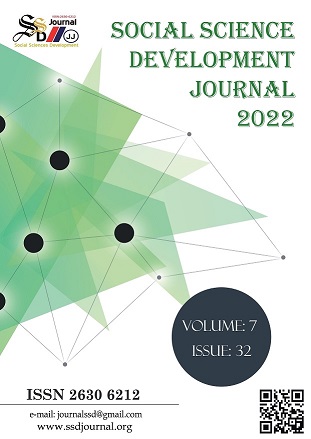CHANGING BALANCES IN SOUTH CAUCASUS AFTER 44 DAYS WAR, KEY AZERBAIJAN AND KEY ZENGEZUR
DOI:
https://doi.org/10.31567/ssd.652Keywords:
International Relations, 44 Day War, South Caucasus, Azerbaijan, ZangezurAbstract
The 44-Day War was a groundbreaking war that radically changed the existing practices and
balances in the South Caucasus. After the collapse of the USSR on December 26th, 1991, Armenia
unjustly occupied Nagorno-Karabakh and the surrounding areas of Lachin, Gubatli, Zangilan,
Cebrayil, Fizuli, Agdam and Kelbajar with the support of Moscow. During these occupations,
thousands of Azerbaijani Turkish women were brutally murdered, along with their children. As a
result of this occupation by Armenia in violation of the rules of international law, Azerbaijan lost
20% of its territory. After that date, until the 44-Day War began, Armenia continued to violate the
borders it had carried out unjustly and to make provocations that had the potential to start a total
war. Finally, President of Azerbaijan Ilham Aliyev, in his speech at the United Nations (UN)
General Assembly on September 25th, 2020, stated that a counter-attack would be launched within
the boundaries of the right to self-defense. He also announced that this operation would be carried
out in order to realize Azerbaijan’s vision of ending Armenia’s unjust occupation in the region. This
honorable war, launched against a long-standing injustice, is the UN Security Council affirming that
Armenia is an occupier and that the occupied territories belong to Azerbaijan, and at the same time
calling on the Armenians to end the occupation; It is compatible with the four UN Decision “822,
853, 874, 884”. The war started against the Armenian occupation elements on September 27th,
2020, ended with the absolute victory of Azerbaijan on November 10th, 2020. According to the
basic principles of international law; attacks to change the borders by using force are not allowed
under any circumstances, and the use of force to protect the attacked country and people is
considered within the boundaries of the “right to self-defense”. Hence the 44 Day War; Since it
complies with the rules of International Law, the UN, the Council of Europe and the Organization
for Security and Cooperation in Europe (OSCE), it does not have a legal problem. The changing
world after the Cold War and the 2008 global economic crisis; It has brought up the changing
security perceptions and the ongoing global and regional conflicts, changing balances, new alliances
and new potential regional power actors. Considering these developments that took place after the millennium, we can say that Azerbaijan is
an important “keyhole” country, especially in the Caucasus region, and by looking at its
geographical location that provides an opening from Europe to Asia, and the key to the lock is
Zangezur. In this study, especially after the 44-Day War, the changing balances and opportunities in
the South Caucasus will be examined. In this context, the importance of the Azerbaijan and
Zangezur corridor, which we describe as the key country that was the absolute winner of the 44-
Day War, will be discussed.




